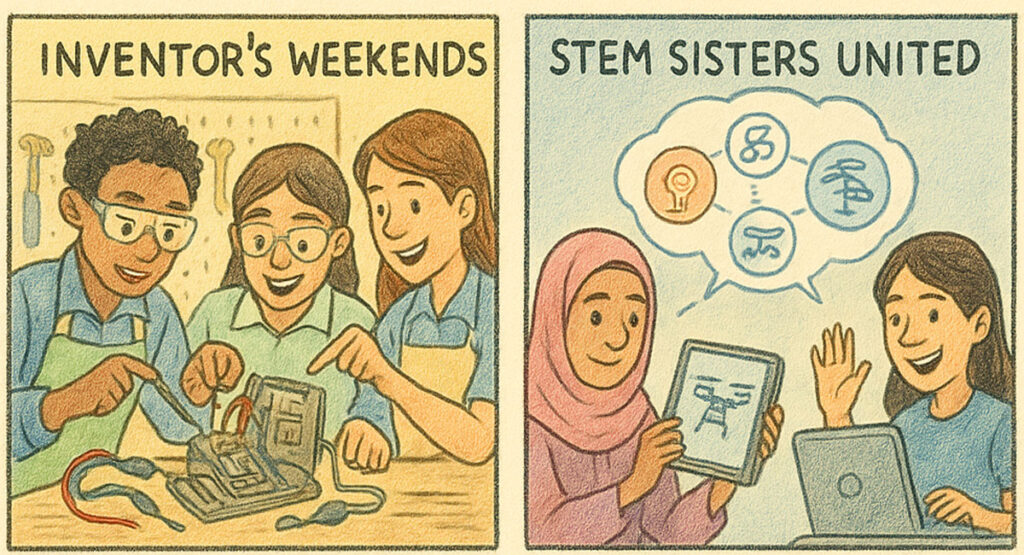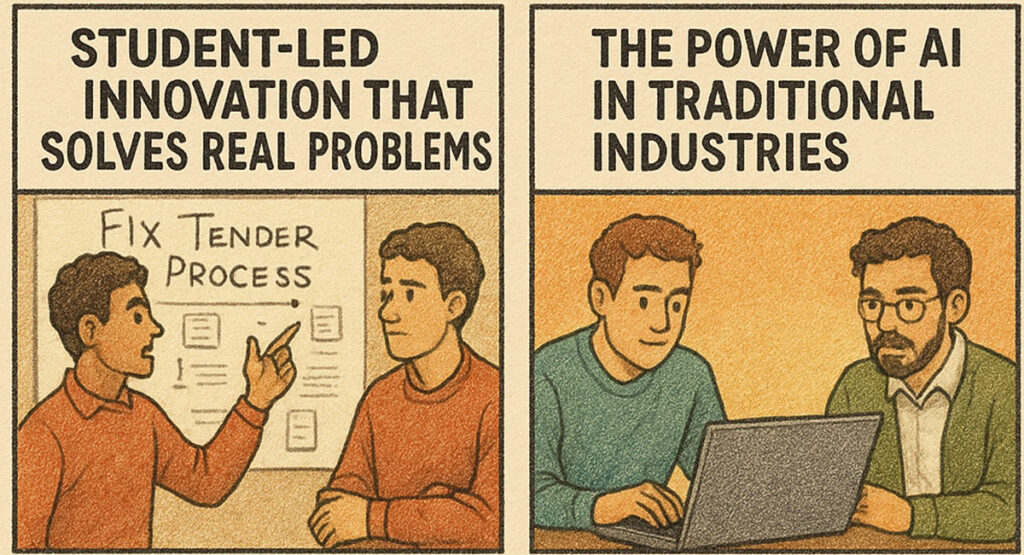In the bustling city of Hyderabad, India, where tradition dances with innovation and every street has a story, a young boy once sat with a cast wrapped around his head and numbers dancing in his mind. His name was Neelakantha Bhanu Prakash — a name now known across the world as the “World’s Fastest Human Calculator.”
But Bhanu’s story wasn’t born in genius or in privilege — it began in crisis.
A Fall That Sparked a Rise
When Bhanu was just five years old, a brutal accident changed the course of his life. He fell while riding his bicycle and suffered a traumatic head injury that would keep him bedridden for a year. For most, this would have been a time of pain and despair. But for Bhanu, it was a quiet metamorphosis. Away from school, playmates, and the world, his mind turned to numbers. Numbers became his playground, puzzles his companions.
What started as a way to keep himself mentally active during recovery soon turned into an obsession. Math wasn’t just a subject anymore — it was therapy, entertainment, and expression.
Discovering a Gift
As Bhanu recovered, something extraordinary became clear — he could perform mental calculations with astonishing speed and accuracy. By the age of 13, he was solving complex arithmetic problems faster than calculators. His family and teachers were stunned. This wasn’t simply about being smart — Bhanu had something special, something rare.
But he wasn’t just content being a prodigy. He wanted to understand why others found math so hard, so intimidating. He began asking a question that would become the central mission of his life: Why do people fear mathematics?
The Rise to Fame: World’s Fastest Human Calculator
Years of training, competition, and relentless curiosity shaped Bhanu into a phenomenon. He began participating in speed arithmetic contests across the globe. From tiny stages in Indian schools to grand auditoriums in Europe and Asia, Bhanu left audiences speechless.
By the time he was in his twenties, he had over 50 world records and titles in mental math. His calculations weren’t just quick — they were blinding. He could subtract 869 from 75,423 in a split second, multiply four-digit numbers in his head, and divide with pin-point accuracy — all without pen, paper, or technology.
At the World Mental Calculation Championships, he earned the title: “World’s Fastest Human Calculator.” The world watched in awe as an Indian boy rewrote what was possible with the human brain.
But even in his triumph, Bhanu carried a deeper concern: Why was he the only one?
The Birth of Bhanzu
While Bhanu basked in the glow of medals and applause, he couldn’t shake off what he had seen in classrooms across India — children who froze at the sight of a math problem, who believed numbers weren’t “for them,” who carried a lifelong fear rooted in a single bad experience.
He knew that speed math wasn’t the answer for everyone, but understanding? Confidence? Joy? That was the real gift.
So, Bhanu made a decision that startled many: he stepped away from competitions and focused on creating Bhanzu, an ed-tech platform with a bold mission — to make math accessible, intuitive, and fear-free for students everywhere.
Bhanzu wasn’t about shortcuts or tricks. It was about reimagining how math was taught — using visual storytelling, personalized challenges, cultural references, and game-based learning to transform the most dreaded subject into a beloved one.
From interactive video classes to AI-driven assessments, Bhanzu brought a breath of fresh air into Indian education. Thousands of students enrolled, and soon the platform grew beyond India — reaching students across Southeast Asia and even parts of the Middle East and Europe.
The Philosophy Behind the Vision
Bhanu’s philosophy was simple yet profound: “Every child can love math — they just haven’t been shown how.”
He believed that math anxiety wasn’t a personal failure but a systemic one — a failure of how the subject was taught. At Bhanzu, teachers were trained not to lecture but to excite. Lessons weren’t measured by tests but by curiosity sparked.
He often said, “If we can teach kids to sing rhymes and stories by heart, we can teach them to see patterns in numbers with the same joy.”
From Educator to Entrepreneur
Though the roots of Bhanzu were educational, Bhanu quickly adapted to the world of entrepreneurship. He was no longer just solving math problems — he was solving real-world ones: hiring the right team, raising investment, building scalable tech, and growing a sustainable business.
Despite his young age, he led his company with surprising maturity — blending the sharp logic of a mathematician with the empathetic soul of a teacher.
Investors took notice. Ed-tech veterans came on board. And Bhanzu began to be recognized not just as a platform, but as a movement — one that challenged the notion that math had to be feared.
By 2025, Bhanzu had reached hundreds of thousands of students, and its curriculum was being integrated into mainstream schools.
Beyond Numbers: The Mission Continues
But Bhanu’s journey wasn’t just about math anymore. It was about human potential.
He began speaking at conferences, delivering TED-style talks, mentoring young talents, and advocating for a world where every child had the right to discover the genius within them. He became a youth icon not for what he could do, but for what he believed others could.
In interviews, he often said, “My goal isn’t to create more human calculators — it’s to eliminate the phrase ‘I hate math’ from our classrooms forever.”
He was invited to academic panels, education reform think tanks, and even UN events focusing on youth development. Still, he stayed rooted to his purpose: to make learning joyful, powerful, and deeply human.
The Boy Who Counted Stars
Bhanu’s life story is one of rare reversals. From a boy recovering from brain injury to the fastest human calculator on Earth. From math champion to math reformer. From individual brilliance to collective impact.
And yet, if you ask him what he’s most proud of, he doesn’t mention records or revenue. He says, “A 10-year-old girl once told me that math is her favorite subject now — that’s the real world record.”
In a world obsessed with speed and performance, Neelakantha Bhanu Prakash reminds us of something deeper — that education is not about pushing numbers, but unlocking minds.
He may be the fastest with numbers, but his greatest legacy is measured not in digits, but in the millions of young hearts now learning to love mathematics, one joyful equation at a time.
The Early Mind Behind the Math
Neelakantha Bhanu Prakash was not born into a family of mathematicians. He came from a middle-class household where values like discipline, education, and perseverance were passed down more through example than words. His parents, both hardworking professionals, nurtured his recovery post-accident with relentless care — not just of his body, but of his spirit.
Bhanu’s grandmother played a crucial role during those early bedridden days. She would sit by his side and tell stories from Indian mythology, filled with patterns, riddles, and moral questions. This sparked something unusual — he began applying mathematical logic to even abstract ideas. His mind started noticing patterns not just in arithmetic, but in life.
Unlike other children who simply memorized tables, Bhanu wanted to understand why numbers behaved the way they did. What made a square number special? Why did some numbers end up repeating in patterns while others didn’t? These weren’t textbook questions — they were the seeds of a mathematician’s mind.
Pushing the Limits of the Human Brain
By his teens, Bhanu was devouring advanced mathematical concepts that weren’t even part of his school curriculum. But what made him different wasn’t just knowledge — it was his discipline of speed.
He created a rigorous personal training routine: waking up before sunrise, timing his calculations, using brain-mapping techniques to track mental fatigue, and designing his own arithmetic games to train faster thinking. Like an athlete, he conditioned his mind for performance — building muscle memory for digits and precision under pressure.
This discipline helped him beat competitors not just from India, but from nations with more advanced infrastructure and access. He wasn’t competing to win medals — he was building a proof-of-concept: that a student from a regular Indian school could outpace the best in the world if given the right mindset.
Bhanzu: The School He Never Had
The name “Bhanzu” is not accidental. It reflects a personal identity — not just of Bhanu, but of the countless students he met who reminded him of his younger self.
Bhanzu was built to answer a painful observation: Even the smartest students were failing in math, not because of capacity, but because of fear. Fear of being wrong. Fear of judgment. Fear of not being “a math person.”
Bhanu believed this fear had roots in how math was taught — robotic, dry, and disconnected from life.
So, Bhanzu introduced a new kind of curriculum:
- Visuo-cognitive learning where numbers were visualized as shapes and colors.
- Gamified modules that turned equations into quests.
- Live group challenges that removed fear and fostered collaboration.
- Cultural math integration, where Indian history, festivals, and even food became math lessons (like calculating rice grains in a biryani pot!).
Bhanzu became a sanctuary for those who once felt excluded by numbers.
Global Impact and Vision
As Bhanzu’s reach expanded across continents, so did Bhanu’s ambitions. He didn’t want to stop at one platform or one country.
He began working with educational ministries, especially in underserved regions, helping them redesign math curriculum from the ground up.
He collaborated with neuroscientists to study how the brain reacts during joyful math learning. The results were powerful: children using Bhanzu’s methods showed 30-40% reduction in math anxiety within months.
Bhanu also advocated for neurodivergent learners, designing modules for dyscalculia and ADHD, believing that no child should be left behind due to outdated systems.
And all the while, he kept returning to classrooms — not as a celebrity, but as a teacher. Whether it was a rural school in Telangana or a coding bootcamp in Nairobi, Bhanu never forgot the faces behind the numbers.
Recognition, But Not Distraction
Accolades came rapidly: Youth Icon awards, Forbes 30 Under 30, EdTech Entrepreneur of the Year, Innovation in Learning laurels, and more. But Bhanu remained grounded.
He didn’t move to Silicon Valley or give in to pressure to commercialize Bhanzu for profit. He turned down offers from large corporations who wanted to acquire his platform. He believed education should not be bought, but shared.
His speeches — full of humor, humility, and hard truths — gained millions of views. But Bhanu made sure to remind the audience that “Being the fastest calculator is a party trick unless you use it to solve real problems.”
Legacy in the Making
By the late 2020s, Bhanzu was piloting its AI-integrated learning environments — where a child’s learning style was analyzed in real time, and the platform adapted accordingly. Whether the child was a visual learner, a pattern finder, or a slow-but-deep thinker — the program reshaped itself to fit their brain.
Bhanu also launched “Bhanzu Labs” — an innovation wing where high school students could build apps, math-based games, and real-world simulations using mathematics. This initiative turned learners into creators.
A scholarship fund in his name began supporting girl students in STEM, especially in regions where math was still considered a “male domain.”
And yet, Bhanu always remained the same boy who once fell off a bike — curious, kind, and chasing the endless mystery of numbers.
A Story Still Being Written
Today, Neelakantha Bhanu Prakash walks two paths: one as a teacher igniting passion, and the other as a builder creating lasting change in how the world sees math.
He often ends his talks with a quote that captures the soul of his journey:
“I once counted stars to fall asleep. Now I help others discover the stars inside themselves — through numbers, through learning, through courage.”
His life is proof that intelligence isn’t what you’re born with — it’s what you build. And that sometimes, the most extraordinary journeys begin not with triumph, but with a fall.
Story Timeline
Bhanzu: Building a Math Empire from a Mission
Neelakantha Bhanu Prakash didn’t set out to build a business — he set out to solve a problem. But in the process, he created one of the most visionary math-focused education companies of the decade: Bhanzu.
Founded in 2020, Bhanzu began as a simple idea with deep roots: make math lovable. But behind that simple mission was a sophisticated, scalable, and deeply human business model.
Bhanzu didn’t rely on rote learning or generic video tutorials. Instead, it offered:
- Live, interactive math classes for students aged 6–16
- Customized learning journeys based on student pace and personality
- Culturally contextual math storytelling to make lessons relatable
- Gamified curriculum built around speed, logic, and creativity
- Real-world math applications like mental finance, puzzles, and spatial logic
With a lean but passionate team of mathematicians, educators, product designers, and developers, Bhanzu quickly gained momentum. It began piloting in select Indian cities and within a year was serving thousands of students across India, Singapore, and the UAE.
Bhanu’s pitch to parents and investors was clear:
🧠 “Math is not a subject. It’s a way of thinking. And when kids think better, they live better.”
Within just three years:
- Revenue grew 10x, crossing multi-million-dollar milestones
- Bhanzu’s programs achieved a 98% parent satisfaction rate
- Over 120,000+ students were trained globally
- Partnerships were established with schools, NGOs, and tech parks
- Bhanzu raised funding from prominent ed-tech investors, making it one of the fastest-growing math learning startups in Asia
But what made Bhanzu different wasn’t just numbers — it was values.
Bhanu ensured that accessibility remained at the core. Scholarships were offered to underprivileged students. Community math drives were launched in rural districts. The platform was translated into regional languages to break linguistic barriers.
Inspiring Words from Bhanu’s Vision
💡 “I don’t want to just create math toppers. I want to create problem solvers, critical thinkers, future leaders.”
🧮 “A child who learns to love math learns to love the process of thinking — and that’s the biggest superpower we can give them.”
🌍 “Our goal isn’t just to teach equations. It’s to shape minds that will write the equations of tomorrow’s world.”
The Vision Ahead
Bhanzu isn’t stopping. The platform is now working on:
- AI-driven math assessments
- Offline math labs for low-connectivity areas
- Teacher training modules to upskill educators worldwide
- A Bhanzu Junior Track for 3–6-year-olds to build number confidence early
- A global math championship for students to showcase real-world problem-solving skills
Neelakantha Bhanu Prakash is not just a founder — he’s a movement leader, an educational reformer, and a storyteller who uses numbers to tell a story of hope, growth, and infinite possibility.
His story tells us this:
🧠 You don’t need a million-dollar idea to change the world. You need a meaningful idea… and the courage to multiply its impact.




















